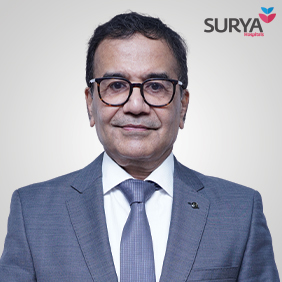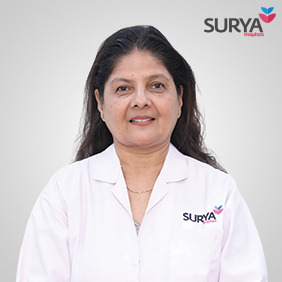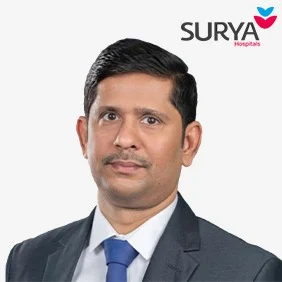Best Pediatrician in Chembur-mumbai at Surya Hospital
Surya Hospitals is a great option if you're looking for comprehensive pediatric care. Offering top-notch pediatric care, Surya Hospitals is committed to delivering this quality of care through its array of services, cutting-edge technology, and highly skilled pediatric specialists. Pediatricians examine, identify, and treat ailments, injuries, and disorders in kids. They monitor growth, give immunisations, write prescriptions for drugs, offer health advice, and make specialist referrals as needed.
You strive for the finest care available when it comes to your child's health. For the purpose of giving your children the best care possible, the top pediatricians have vast knowledge and experience. These experts are skilled at identifying complicated conditions and establishing strategies for treatment that support the best possible growth and development because they have spent years honing their skills. For any medical need your child may have, visit Surya Hospitals right now.
What is the Education Qualification of a Pediatrician?
- 5-years MBBS degree (Bachelor of Medicine and Bachelor of Surgery)
- 3 years M.D.(Doctor of Medicine) in Paediatrics and Child Health
Who is a Pediatrician?
A pediatrician, also known as a pediatric physician, is a medical professional who focuses on diseases that affect infants, toddlers, children, adolescents, and young adults. Growing up brings about rapid changes in a child's behavior, emotions, and physical state. Doctors who treat adults may not be qualified to handle the special health concerns of children and teenagers
Pregnancy can start with pediatric care and continue throughout. A large number of pediatricians practice primary care. The aforementioned type of pediatrician conducts routine examinations for wellness and health of the children. In addition, they provide vaccinations, diagnose and treat a broad range of general health issues, and counsel young people and their parents or caregivers on matters related to their health. Some pediatricians focus on treating particular diseases or age groups. Among the subspecialties in pediatrics are the following:
Adolescent medicine specialists focus on care during adolescence, around 11 to 21 years old.
- Critical care pediatricians
- Developmental behavioral pediatricians
- Child abuse pediatricians
- Pediatric oncologists
- Pediatric cardiologists
- Pediatric pulmonologists
- Pediatric rheumatologists
- Pediatric nephrologists
- Pediatric neurologists
- Neonatal-perinatal pediatricians
- Pediatric gastroenterologists
- Pediatric endocrinologists
- Pedodontist
What Diseases Does a Paediatrician Treats?
Following are the issues that Paediatricians treat:
- Colds/Coughs/Infections
- Childhood Developmental Anomalies
- Birth Defects
- Attention Deficit Hyperactivity Disorder (Adhd)
- Minor Injuries
- Autism
- Respiratory Infections
- Urinary Tract Infections
- Ear Pain
- Bronchitis
- Bacterial Sinusitis
- Gastritis
- Gerd (Gastroesophageal Reflux Disease)
- Anemia
- Nutrition Deficiencies
- Chronic Inflammations
- Asthma
- Chickenpox
- Diphtheria
- Leukemia
- Measles
- Mumps
- Pneumonia
- Polio
- Tuberculosis
- Whooping Cough
- Lyme Disease
- Fever
- Down's Syndrome
- Tooth Decays
- Headaches Like Childhood Migraines
- Cystic Fibrosis
- Chagas Disease
- Candidiasis
- Cancer
- Bronchiolitis
- Fracture
- Dislocations of Joints
- Muscle Tears
What Procedures or Surgical Interventions are Offered by Paediatricians?
Following are the common pediatric emergencies:
- Uphold routine health and wellness examinations (also known as well-child or well-baby visits)
- Perform physical examinations
- Keep an eye on your child's social, emotional, and physical growth.
- Recognize and address injuries, illnesses, and other medical issues
- Vaccinate patients enhance the immunity to various infections
- Give prescription drugs for treatment of diseases
- Pay attention to the fears and concerns of parents
- Give parents health advices
- Families should be referred to specialists according to their requirements
- Managing fractures and joint dislocations
- Perform the surgeries in children for treating the underlying problems
What Emergencies are Handled by Paediatricians?
Following are the pediatric emergencies:
- Severe pain
- Troubled breathing
- Wheezing
- Flaring the nostrils
- Straining other body muscles while breathing
- Ongoing or unmanageable diarrhea or vomiting
- Injuries due to fall, accident, or playing
- Few or no bowel movements for long
- Pain during defecation
- High fever
- Exposure to harmful materials such as pesticides, cleaning agents, and other non-food items
- Dehydration symptoms include sunken eyes, little to no tears when crying, a dry or sticky mouth, and using fewer diapers than usual
- Extreme lethargy or irritability
- Chest sinking
- Signs of allergic reactions like hives, rashes, breathlessness
- Poisoning
- Burns
- Drowning
- Smoke inhalation
- Critically reduce body temperature)
- Heatstroke
- Chickenpox
- Congenital heart problems
- Metabolic imbalance
- Blood disorders like sickle cell anemia
- Brain disorders
- Cancer
How to Choose the Best Pediatrician?
You should find the right pediatrician for your child’s overall well-being. The following advice will assist you in selecting the top pediatrician:
- If you have health insurance for your child, the details of his/her policy should list the pediatricians in your area that are covered by your plan. Choose your pediatrician from the list.
- Your friends, family, and coworkers may be excellent sources for recommending a pediatrician that's most suitable for your child. Since they are familiar with you, they probably know exactly the kind of doctor you or child would need.
- You can learn a lot about a doctor's communication style, qualification, experience, and expertise from social media or apps.
- If you require emergent care then you must choose the best pediatrician who is well known in your area. On the other hand, you can choose your doctor irrespective of the region if you don’t require emergent care. In such a scenario, the doctor’s expertise should be preferred.
- Look for the hospital in which those doctors are working to check if those hospitals have the good infrastructure and your child’s insurance policy coverage.
- Growing up brings about rapid changes in a child's behavior, emotions, and physical state. Choose a doctor who is qualified enough to handle the special health concerns (emotional & physical) of children and teenagers.
- He should be able to provide the comprehensive care to your child in most friendly way
- He or she must aware of modern therapeutic techniques and equipment
- He or she must have expertise in performing minimally invasive or non-invasive procedures
What are the Characteristics of a Good Pediatrician?
The pediatrician must have following characteristics:
- Highly recommended by your near and dear ones
- Friendly
- Approachable
- High patient satisfaction ratings & great reviews
- Ability to deliver quality of care
- Ability to provide advanced care
- Ability to use latest techniques and equipment
- More years of experience
- High expertise of delivering care you need
- Similar values as well as beliefs


















